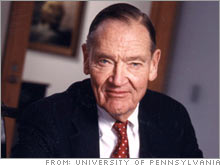Bogle: Still scolding after all these yearsMutual fund visionary Jack Bogle on life, near-death and what investors need to focus on now.NEW YORK (Money Magazine) -- When Jack Bogle, founder of the Vanguard group of mutual funds, says that he has just reached his 11th birthday, he is only partly kidding. In 1996, ravaged by at least seven heart attacks and a failed pacemaker, Bogle received a heart transplant; without it he would have died.
Today Bogle has the energy of someone half his 77 years. He has just finished his sixth book, "The Little Book of Common Sense Investing," serves as chairman of the National Constitution Center in Philadelphia, still plays a slashing game of squash and continues to blast mutual funds and corporations for their greed and conflicts of interest. Meanwhile, the company he founded in 1974 has become a giant; Vanguard manages more than $1.1 trillion for over 22 million people. Money Magazine's Jason Zweig recently chatted with Bogle about what makes him tick - and what he thinks really matters. Question How did you cope with decades of living on borrowed time? Answer I didn't think about it. I just got on with what needed to be done. Even as a little boy, I had determination and focus. If there was a job to be done, then that is what I would think about, going through life with blinders on. You can look ahead, but you have no peripheral vision. That focus is an unbelievable asset when you're confronted with a life-threatening disease, and it was also terrific for a kid who was determined to succeed in business. Question Back in 1974, almost everyone but you thought Vanguard would never get off the ground. Answer The awful thing is, it was easy. It's amazing how easy life becomes when you realize that your job is not to deal with what might have been but with what is. It's all about attitude. Question What did you learn from getting a second chance at life? Answer The right time to count your blessings is every day. If you do it once, then it's worth doing twice a day too, and three times and more. We're blessed with the health we have. We're blessed to be American citizens. We're blessed to be alive in these amazing times. How could I complain? When you have a narrow escape, the operative word is not "narrow," it's "escape"! Question Boil down your new book for us. Answer As an investor, you want to ignore the expectations market and instead just trust earnings growth and dividend yields to give you a return over time. And get cost out of the equation. The more your funds' managers make, the less you make. Question What's the "expectations market"? Answer Investors spend too much time focusing on what they think other people will think a stock will be worth; that's psychology, not reality. People don't focus nearly enough on what I call the "real market," or the value of real companies run by real people making real products and services. Question But investing is all about the future. We need expectations. Answer The stock market turns out to be a giant distraction from the reality of owning businesses, which is what investing really is. In the short run, expectations seem to drive the market, but in the long run nearly 100% of the returns on stocks come from the real market - the sum of dividend yield and earnings growth. Question Exchange-traded funds [or ETFs, mutual-fund-like portfolios that trade like stocks] are all the rage. Your view? Answer The big thing now in ETFs is commodity indexes. Stocks and bonds generate income. There's a baseline of cash flow that shows where the assets' value comes from. But commodities like gold or copper or oil have no underlying source of support. It's become a whirlpool of speculation. Question Vanguard is a not-for-profit company. If you'd organized it differently, you'd be a billionaire today. Any regrets? Answer I read this story recently: There's a big cocktail party on Martha's Vineyard. Someone comes up to this writer, I think it's Joseph Heller [author of "Catch-22"], and says, "Joe, see that guy over there? He's a hedge fund manager, and he made more money yesterday than you made on all the books you have ever published." Heller looks over, pauses and says, "Yeah, but I have something he'll never have: enough." And I have enough too. Question Isn't it time to take a victory lap and retire? Answer Every once in a while I think a day of doing zero might be a good idea. But there's too much left to do. Minds over Money: In honor of Money Magazine's 35th anniversary, we're running special interviews with the smartest thinkers we've come across in three-plus decades. John Rogers: Buy. Hold. Profit. Give Back. Bill Sharpe: The man who explained it all Robert Shiller: Mr. Worst-case scenario Olivia Mitchell: Scholar of the boomers' future Ralph Wanger: Winning the home run hitter's game Charles Schwab: The smartest way to invest |
| ||||||

